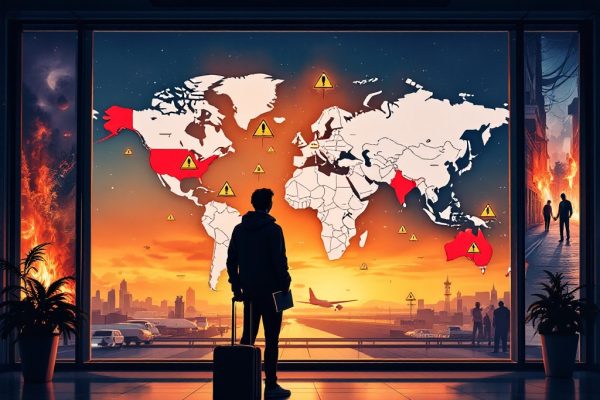What You Should Know About Travel Insurance
Worried about unexpected hiccups on your next trip? Travel insurance offers crucial financial protection against medical emergencies, trip cancellations, and lost luggage, ensuring peace of mind. Discover how travel insurance safeguards your trip investment, covering expenses from medical evacuations to lost baggage reimbursement. Learn how to choose the right plan, understand policy exclusions, and navigate the claims process. Secure your trip and your finances – explore the comprehensive guide to travel insurance now.
Important information

- Travel insurance safeguards travelers from financial risks associated with unexpected trip cancellations, medical emergencies, and lost luggage.
- Coverage can include trip interruption, medical evacuations, repatriation, and even specific situations like rental car damage or accidental death.
- Policies often exclude pre-existing conditions, pandemics (unless CFAR is purchased), extreme sports injuries, and travel against government advisories.
- Travel insurance costs 4-10% of your total trip expenses and varies based on age, destination, trip length, and coverage level.
- To maximize benefits, understand your policy details, use assistance services when needed, and keep all documentation for claims.
What You Should Know About Travel Insurance
Travel insurance protects you from unexpected travel disruptions. A comprehensive policy offers peace of mind, allowing you to travel confidently knowing you’re protected against trip cancellations, medical emergencies, and other unforeseen issues.
What Is Travel Insurance?
Travel insurance protects your finances during trips by covering unforeseen problems like trip cancellations, medical emergencies, and lost luggage. Trip cancellations can be expensive, but travel insurance helps reimburse these costs. If you get sick or injured abroad, it can handle the medical bills that your regular health insurance might not cover. This supplemental coverage eases the financial burden of unexpected events. Lost luggage can also be a major problem, but travel insurance can help replace essential items. Some policies even cover emergency evacuations and repatriation, giving you comprehensive protection and peace of mind wherever you go.
Why Is Travel Insurance Important?
Travel insurance is essential for safeguarding yourself against unforeseen expenses like medical emergencies, trip cancellations, and lost luggage. It acts as a safety net, minimizing stress during unexpected incidents and ensuring you receive necessary care and support. Moreover, it covers non-refundable expenses, making your travel experience safer and more enjoyable.
Benefits of Travel Insurance
Protection against unforeseen events: Travel insurance offers crucial financial protection against unexpected medical costs, trip cancellations, and lost or stolen luggage, reducing your financial burden during such incidents.
Peace of mind: Knowing you’re covered provides peace of mind, allowing you to fully enjoy your trip without worrying about potential disruptions or unexpected expenses.
Why Travel Insurance Matters
Minimizes financial risks: Without travel insurance, unexpected medical bills, trip cancellations, or lost luggage can lead to substantial out-of-pocket expenses. Travel insurance significantly reduces these risks.
Essential assistance: Travel insurance offers vital services like medical assistance during emergencies, ensuring you get the necessary care and support when you need it most.
Medical emergencies: Illness can strike unexpectedly while traveling. Travel insurance provides coverage for medical expenses abroad, minimizing your financial burden.
Trip cancellations: Unexpected events can force you to cancel your trip. Travel insurance can reimburse you for non-refundable expenses, protecting your investment.
Lost luggage: Losing your luggage can be a costly and inconvenient experience. Travel insurance can cover the cost of replacing essential items, reducing the stress and financial impact.
Financial Protection Against Travel Risks
Travel insurance protects you from unexpected travel costs, covering trip cancellations, medical emergencies, and lost luggage. These unforeseen events can disrupt your travel plans, but travel insurance offers essential financial protection. For example, if your flight is canceled, you can get a refund. Moreover, it covers medical expenses abroad. Investing in travel insurance is a smart choice for peace of mind while traveling.
- Coverage for trip cancellations.
- Medical emergency coverage.
- Lost luggage protection.
Peace of Mind for Travelers
Travel insurance protects you from unexpected problems, giving you peace of mind so you can enjoy your trip.
What Does Travel Insurance Typically Cover?
Travel insurance protects your trips by covering trip cancellations, interruptions, medical expenses, and emergency evacuations. It also typically covers lost or delayed baggage and travel delays. Some plans even cover rental car damage and personal liability. However, coverage varies, so carefully review your policy details and choose a provider wisely.
Trip Cancellation and Interruption
Trip Cancellation Insurance
Trip cancellation insurance protects your prepaid, non-refundable travel expenses if you have to cancel your trip. This includes costs such as flights, accommodations, and excursions.
Trip Interruption Insurance
Trip interruption insurance covers the remaining portion of your trip if an unforeseen event forces you to return home early. This includes expenses like your flight home and any forfeited hotel stays or other prepaid costs.
Medical Expenses and Emergency Evacuation
Traveling abroad? Travel insurance offers crucial medical protection, covering unexpected medical costs like doctor visits, hospital stays, and prescriptions. If local medical care is inadequate, emergency evacuation coverage transports you to a suitable facility or back home, possibly via air ambulance. Understanding your policy’s details, including coverage and limitations, is vital for ensuring adequate protection.
Baggage Loss and Delay
Travel insurance is a worthwhile investment for several reasons. Lost luggage protection reimburses you for lost or delayed baggage, covering the cost of your belongings. Trip delay coverage compensates you for unexpected expenses incurred during unforeseen delays, such as:
- hotel accommodations,
- meals,
- local transportation.
This coverage is activated during unexpected delays caused by severe weather or other travel disruptions, providing peace of mind throughout your journey.
Accidental Death and Dismemberment
Accidental Death and Dismemberment (AD&D) insurance offers financial support if a covered accident during travel leads to death or limb loss. These accidents typically occur on commercial transportation like planes, trains, or buses. Dismemberment encompasses the loss of limbs, fingers, toes, eyesight, and hearing. AD&D benefits complement life insurance and travel medical policies by addressing these unforeseen events. However, they are not a substitute for comprehensive life insurance, as AD&D only covers accidental death and dismemberment, not illnesses or deaths from natural causes. Consider AD&D as a supplemental safety net for travel, offering vital support during challenging times.
Cancel For Any Reason (CFAR) Coverage
Upgrade your travel plans with Cancel For Any Reason (CFAR) insurance. This upgrade offers unparalleled flexibility, allowing you to cancel your trip for any reason and receive reimbursement for a significant portion of your non-refundable expenses (typically between 50% and 75%). Unlike standard trip cancellation policies that cover only specific events like illness or severe weather, CFAR provides broader coverage and empowers you with more choices. Secure this valuable protection by purchasing CFAR shortly after your initial trip deposit and ensure your prepaid, non-refundable trip expenses are fully insured.
What Does Travel Insurance Not Cover?
Travel insurance is essential, but understanding its limitations is crucial. Many misconceptions exist about coverage. For example, pre-existing conditions, epidemics, pandemics, and injuries from extreme sports like off-piste skiing are often excluded. Losses from war, civil unrest, and non-essential cosmetic procedures are typically not covered. Risky behaviors, such as intoxication, can also invalidate your policy.
Pregnancy and childbirth expenses are generally not covered, although life-threatening complications may be an exception.
Ignoring government travel advisories could lead to denied claims, so always check before your departure.
A thorough understanding of these exclusions helps travelers make informed decisions and emphasizes the importance of carefully reviewing your policy details.
Pre-Existing Conditions
Travel insurance typically doesn’t cover pre-existing conditions. However, purchasing a policy soon after your initial trip deposit might offer some protection for these conditions. Some plans provide this benefit, so review your policy details carefully. Understanding your coverage beforehand helps avoid unexpected issues and ensures a smoother trip.
Epidemics and Pandemics
Conventional travel insurance often excludes cancellations due to foreseeable events like pandemics. A “Cancel For Any Reason” (CFAR) upgrade can address this limitation, although it increases the cost. Some policies now offer specific COVID-19 coverage. Review your policy details to understand its provisions regarding epidemics and pandemics. This will ensure you have adequate coverage and peace of mind.
Other Common Exclusions
Travel insurance policies often exclude pre-existing medical conditions. Injuries from extreme sports or high-risk activities are also frequently excluded, as is travel to countries under government advisories or warnings. Incidents involving alcohol or drug use are typically not covered. Carefully review your policy for specific exclusions, as failing to adhere to its terms can invalidate your claim.
How Much Does Travel Insurance Cost?
Travel insurance typically costs between 4% and 10% of your trip’s total expense. This price varies based on several factors, including your age, destination, trip duration, and the extent of coverage you choose. Comprehensive policies offer greater protection with higher coverage limits and additional perks, but they also come at a premium.
Factors Affecting Insurance Premiums
Several factors influence travel insurance premiums. Your age, destination, trip length, and chosen coverage level all play a role. Naturally, more comprehensive coverage increases the cost, as do longer trips and adventurous destinations. Older travelers may also face higher premiums due to potential health risks. The key is finding the sweet spot between cost and coverage. For instance, a younger traveler on a short trip might opt for a less comprehensive plan. Comparing various insurance options is always recommended to secure the best value.
Cost as a Percentage of Trip Price
Travel insurance typically costs between 4% and 10% of your trip’s total expense. This cost varies based on several factors, including your age and destination. Trip duration and desired coverage amounts also influence the price. While comprehensive policies offer greater protection with higher coverage limits and additional benefits, they also come with higher premiums.
How to Choose the Right Travel Insurance Plan
Planning a safe trip involves several key steps.
Determine your destination and trip length. Think about your planned activities, especially if they include adventurous activities like extreme sports.
Consider your health conditions as a factor in your planning. Pre-existing conditions may influence your choice of activities and destinations.
Thoroughly research travel insurance. Examine policy limits for medical expenses, trip interruptions, and lost luggage.
Compare different providers, benefits, and costs. Don’t settle for the first option you find.
Read customer reviews. They can offer valuable insights into the quality and reliability of different insurance providers.
Make an informed decision based on your research. Choosing the right travel insurance can provide peace of mind during your trip.
Assess Your Travel Risks and Needs
Planning a trip? Choosing the right travel insurance is key. Consider your destination and planned activities. Are you traveling to a remote location or participating in adventurous activities like skiing or scuba diving? These factors will influence the coverage you need.
Assess the Risks
Is your destination prone to natural disasters? If your trip involves high-risk activities, ensure your policy includes higher coverage limits. Also, consider your health and any pre-existing conditions. Make sure these are covered to avoid unexpected medical expenses.
Crucial Coverage
Confirm your policy covers medical evacuation, especially for remote destinations. It’s also wise to have coverage for trip cancellations and lost luggage. Compare different policies before purchasing, as they vary significantly.
The right travel insurance protects both you and your trip investment.
Evaluate Coverage Limits and Exclusions
Before your trip, thoroughly review your travel insurance policy to confirm it provides sufficient coverage for various scenarios, such as trip cancellations, interruptions, medical emergencies, and lost baggage. Pay close attention to policy exclusions that could lead to claim denial, including pre-existing medical conditions, participation in high-risk activities, or travel to specific destinations. Comparing different travel insurance policies will help you select the best option that balances comprehensive coverage with affordable cost.
Compare Insurance Providers and Policies
Start by checking reviews and coverage details.
Compare various policies, paying close attention to coverage limits, exclusions, and costs.
Assess your individual needs based on your trip, including potential risks, destination, planned activities, and your health status.
Factor all of these elements into your decision.
Understanding the Claims Process
Notify your insurance company immediately after an incident. This ensures a smoother reimbursement process.
Provide all essential documentation. This includes receipts, medical reports, and police reports (if applicable).
Carefully review your specific policy, as procedures vary between insurance companies.
File your claim by submitting the required documents online or via email within the specified timeframe.
For trip cancellations, gather proof such as cancellation confirmations and receipts for non-refundable expenses.
For medical claims, provide all necessary medical records and bills.
For lost luggage claims, include baggage tags, purchase receipts, and a police report if available.
Always keep copies of all submitted documents for your records.
Filing a Claim for Trip Cancellation or Interruption
Gather all necessary documentation, including receipts and a clear explanation of the reason for your trip cancellation or interruption.
Contact your insurer to understand their specific claim procedures and obtain any required forms.
Submit your claim either online (if available) or via email, ensuring you include all requested documentation.
Adhere to the claim filing deadline specified in your policy to avoid potential delays or rejection.
Claiming Medical Expenses and Emergency Services
Retain all your receipts, medical reports, and bills, as these are essential for any medical treatment abroad.
After a medical emergency, promptly complete a claim form, readily available on your insurer’s website.
Contact your travel insurance provider immediately, as some policies may require pre-authorization for certain treatments.
Reviewing your policy details is crucial.
Reimbursement for Baggage Loss and Delay
File a lost baggage report with the airline immediately. Obtain a copy of this report as it’s essential for your claim.
Gather all necessary documentation. This includes receipts for expenses incurred because of the lost or delayed baggage, such as toiletries, clothing, and other essential items.
Review your travel insurance policy. Check for specific coverage details regarding lost, damaged, or delayed baggage. Note the coverage limits and any exclusions that may apply.
Contact your travel insurance provider. Initiate a claim by providing them with the required documentation, including the airline’s lost baggage report and receipts for expenses. Be prepared to provide additional information as requested by your insurer.
Is Travel Insurance Worth It?
Is travel insurance worth it? It depends on your trip and potential risks. Weigh the cost of coverage against potential financial losses. Pricey trips and adventure activities, like skiing, often warrant extra protection. Budget travelers might find the cost prohibitive. Travel insurance offers financial security and peace of mind, especially valuable during unexpected events.
Weighing the Benefits and Costs
Travel insurance protects you from unexpected travel problems, such as trip cancellations, medical emergencies, and lost luggage. These events can be costly, but travel insurance premiums are usually affordable—often much less than the potential financial strain of an unanticipated issue. For example, emergency medical care in a foreign country can lead to huge bills, and rebooking a cancelled flight is another significant expense. Travel insurance helps mitigate these risks, providing valuable peace of mind and making it a smart investment for many travelers.
Considerations for Different Types of Travel
Leisure Travel
For leisure trips, a basic travel insurance plan is usually enough. This typically covers:
- trip cancellations,
- trip interruptions,
- lost baggage,
- medical emergencies.
Business Travel
Business travel often requires specialized coverage. Consider these additions:
- coverage for business equipment,
- trip delay coverage.
Adventure Travel
Adventure travel necessitates specific policies for activities like:
- hiking,
- scuba diving,
- extreme sports.
Look for policies with higher medical coverage and emergency evacuation.
Choosing the Right Policy
The best travel insurance depends on your trip type and individual needs. Consider the specifics of your trip and any potential risks to choose the right coverage.
Best Practices for Maximizing Travel Insurance Benefits
Traveling can be unpredictable. For peace of mind, contact your travel insurance assistance services if you need help. They offer immediate support for emergencies, lost luggage, and travel disruptions, guiding you through challenging situations.
Before Your Trip
Familiarize yourself with your policy’s terms and conditions to understand what’s covered and what isn’t. This knowledge maximizes your benefits and prevents claim rejections.
Claims
Be sure to review the claim procedures.
Using Assistance Services
Travel insurance assistance services offer extensive support 24/7 around the globe. From medical emergencies and lost passports to translation services and legal referrals, they are ready to help. For specifics regarding your plan, contact your provider.
Knowing Policy Terms and Conditions
Understanding your insurance policy is crucial. This includes knowing what’s covered and, importantly, what’s excluded. Familiarize yourself with the claims process to prevent rejections and ensure you receive all due benefits. Thoroughly reviewing your policy details helps you confidently access your entitled benefits.


















